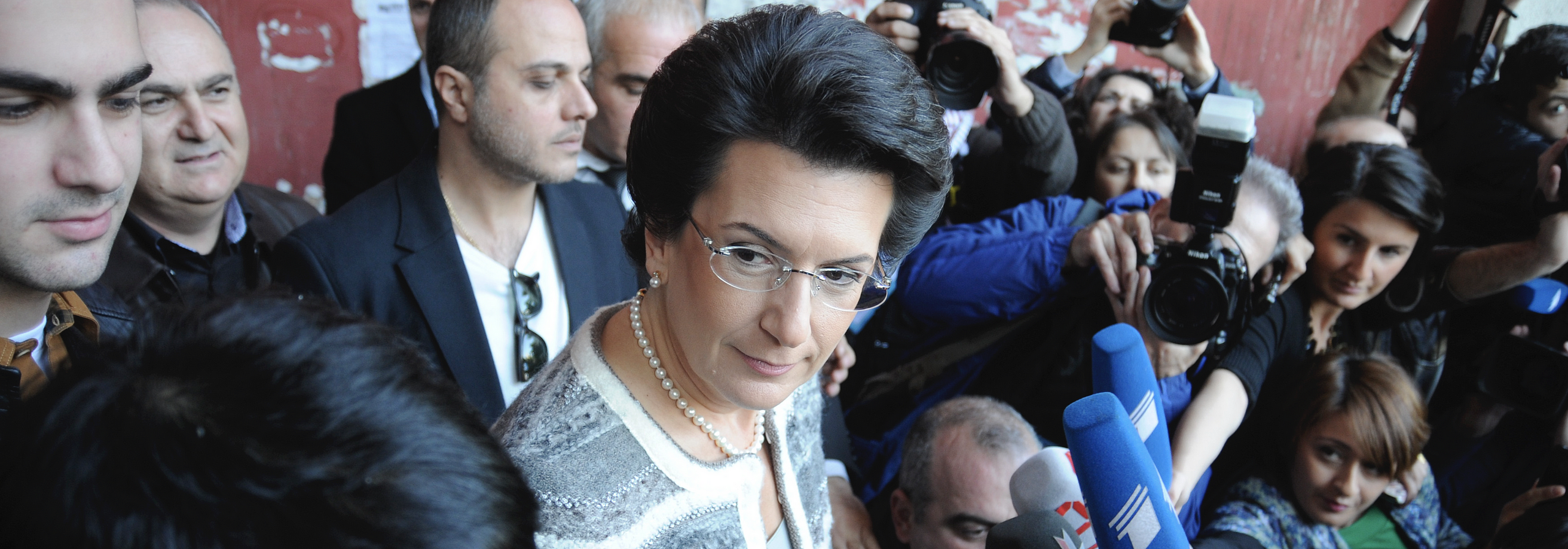Leaked 2019 audio of discussion between pro-Russian Georgian politician and a Russian official recirculated by POSTV

On February 25, 2021, a leaked audio recording from a 2019 conversation between a Georgian and a Russian politician started recirculating in Georgian pro-government media outlets and Facebook groups. The recording, which has appeared on Facebook before, features Nino Burjanadze, a leader of the Georgian pro-Russian Democratic Movement party, and Konstantin Kosachev, Chairman of the Foreign Affairs Committee of the Federal Council of the Russian Federation.
Burjanadze has long been known in Georgia for being generally sympathetic toward the Kremlin. However, following Georgia’s October 2020 parliamentary elections, which were plagued by alleged irregularities and physical confrontations at polling stations and called into question by the opposition, Burjanadze joined the largely pro-Western coalition against the ruling party to protest election results. All of the opposition parties boycotted the legitimacy of elections and refused to enter parliament.
Georgia is once again in a political crisis. On February 23, police stormed the offices of the largest opposition party, United National Movement (UNM), and arrested its chairman, Nika Melia. The arrest prompted the resignation of Prime Minister Giorgi Gakharia. The opposition and several NGOs have called the arrest of Melia politically motivated, while the international community also expressed concern at Melia’s detention and the resulting escalation in political tensions. The U.S. State Department called for an immediate de-escalation, while the U.S. Helsinki Commission and U.S. lawmakers demanded Melia’s release.
Leaked audio
In the leaked 2019 recording, Burjandze and Kosachev can be heard discussing Russian MP Sergei Gavrilov and his visit to Georgia in June 2019, which sparked widespread protests in the country. Gavrilov, closely associated with the Kremlin and the Russian Orthodox Church, addressed Georgian lawmakers from the speaker’s chair in the Georgian Parliament, which many Georgians saw as an affront to the nation’s sovereignty. The incident triggered days of protest in Tbilisi against the Russian occupation of Georgia, as well as disinformation attempting to discredit the protesters.
Burjanadze is heard apologizing to Kosachev for what happened during Gavrilov’s visit; she also assesses the protests sparked by Gavrilov’s presence and the broader resistance to Russian occupation as an insult to the Georgian state. “I won’t be afraid to apologize for that absolutely sad incident,” she can be heard saying. “I think that it is an insult, first of all, of Georgian people and Georgian state. And we, all the normal people, took it as personal insult.”
Though TASS originally published the recording on December 6, 2019, it was circulated by POSTV on February 25, 2021. POSTV is a government-affiliated television outlet that has engaged in disinformation campaigns in Georgia. The DFRLab previously published research suggesting that POSTV and an ultra-nationalist Georgian party called Georgian March used a shared inauthentic network on Facebook to promote their respective content.
In its recent Facebook post recirculating the audio, POSTV did not indicate in the caption that the audio leak was from 2019. A translation of the caption says, “Nino Burjanadze apologizes to Russian politician over so-called Gavrilov events. TASS publishes the audio recording.” In addition to sharing the audio on Facebook, POSTV also published a Georgian translation of the transcript of the audio on its website, where they did indicate that the conversation was from 2019.

According to a search conducted via the social media monitoring tool CrowdTangle, the original publication of the leaked recording by TASS on December 6, 2019 received renewed interest from Georgian Facebook pages and groups on February 25, 2021. It had previously been featured in a Georgian Facebook group the same day the TASS article was published back in 2019.

To check whether article had been altered after the initial publication, DFRLab analyzed the date and time of the page’s source code. According to the code, the article was published and last edited at 12:55 p.m. GMT+3 (Moscow time) on December 6, 2019. The Internet Archive’s Wayback Machine stored an archival version of the article as it looked on December 8, 2019, at 3.29 pm. The archive features the exact same publication and modification date, but in a different time zone — 9.55 am GMT+0 time, due to the Wayback Machine settings.

Finally, TASS supplemented the article with an audio file with a duration of 6 minutes 22 seconds. The archived version seems to be lacking the audio file due to the archive structure. However, the archived link is still hidden in the source code and still available via the old TASS link.

Old audio leak misleadingly presented as new amid political crisis
The 2019 TASS article leaking the conversation between Burjanadze and Kosachev was shared by several Georgian pro-government pages and in pro-government groups on February 25, 2021.

The old leak was shared by the POSTV Facebook pages as well as pro-government Facebook groups with a few minutes’ interval between some of the posts, indicating possible coordination.

At the time of writing, the post of the recording on the Facebook page of POSTV garnered 744 reactions, mostly consisting of angry reactions, 851 shares, and 263 comments. The comments criticized Burjanadze for seemingly cooperating with Russia and insulted pro-Western opposition parties, calling them pro-Russian.
During a political crisis, the information environment can be vulnerable to manipulation, and that manipulation often takes the form of circulating old or recycled information and presenting it as if it were new, in order to exacerbate the crisis.
Eto Buziashvili is a Research Associate, Caucasus, with the Digital Forensic Research Lab.
Roman Osadchuk is a Research Assistant, Eurasia, with the Digital Forensic Research Lab.
Follow along for more in-depth analysis from our #DigitalSherlocks.

